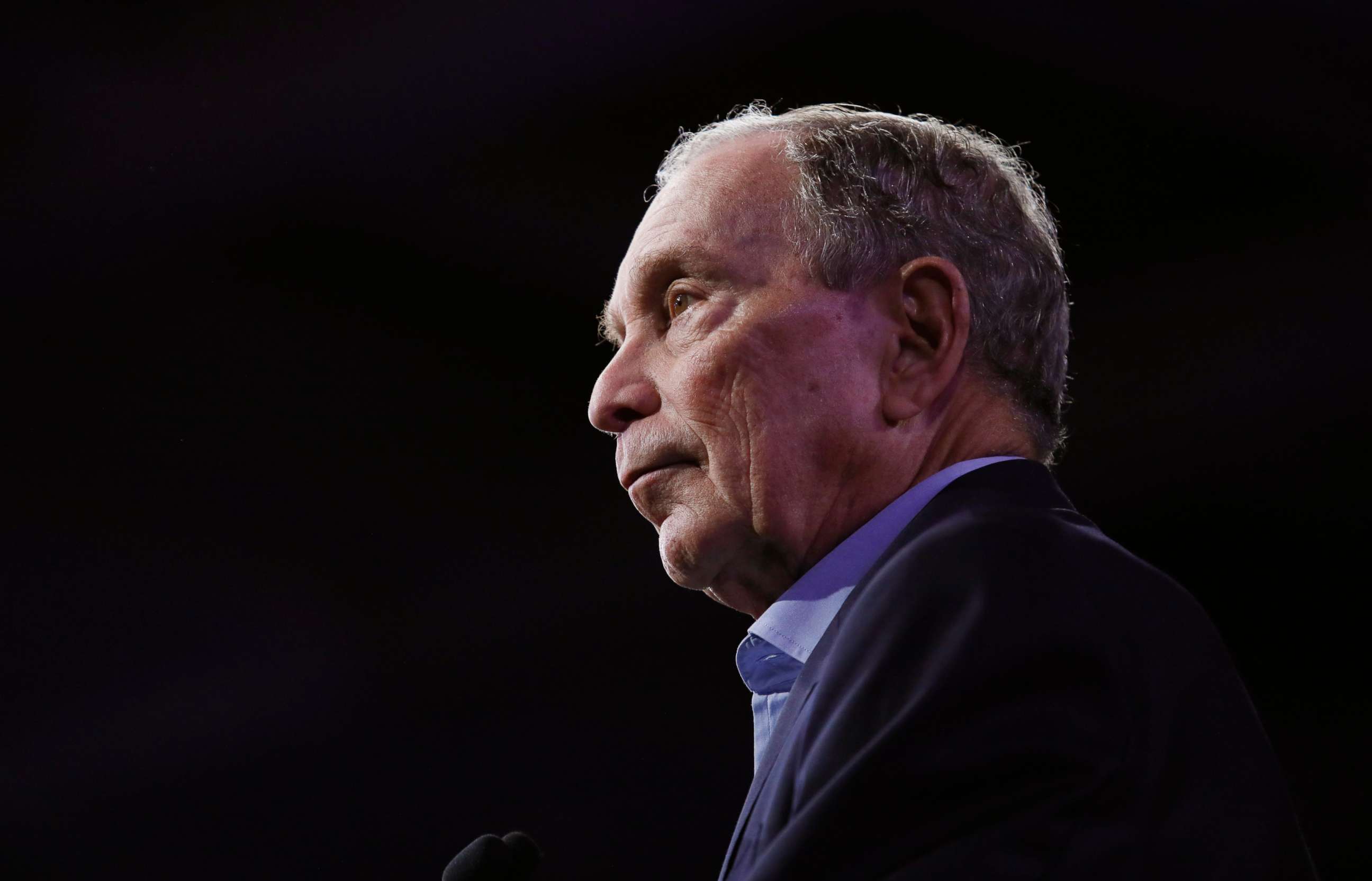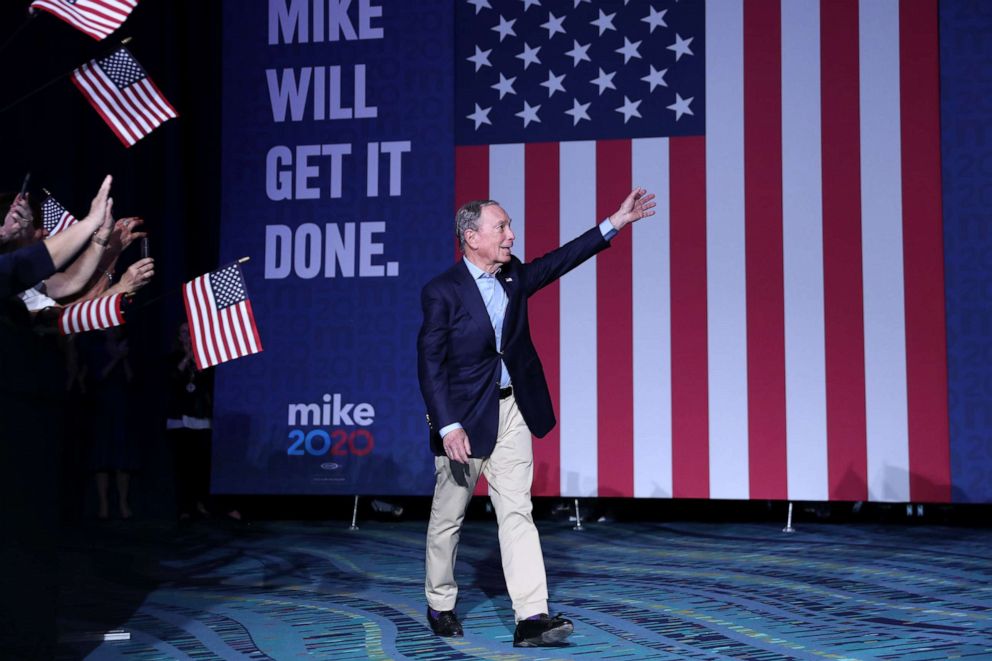Michael Bloomberg ends his presidential bid
The billionaire had a disappointing showing on Super Tuesday.
Former New York City mayor Mike Bloomberg, a centrist billionaire who launched a White House bid after years of flirting with a run, and pledged to use his vast resources to unite Democrats and moderate Republicans against President Donald Trump has suspended his campaign and is endorsing former Vice President Joe Biden.
His campaign was shaken by Biden’s resurgence and overwhelming victory in the South Carolina primary, which reignited the former vice president's bid and led other moderate candidates to drop out of the race end endorse him in an effort to consolidate the primary vote and prevent Vermont Sen. Bernie Sanders from clinching the party’s nomination. By Super Tuesday, it was clear that Bloomberg's efforts to target the 15 contests in play in lieu of traditional campaigning methods of hitting the early voting states simply did not pay off in terms of netting the bulk of pledged delegates or the popular vote.
“Three months ago, I entered the race for President to defeat Donald Trump. Today, I am leaving the race for the same reason: to defeat Donald Trump – because it is clear to me that staying in would make achieving that goal more difficult," he wrote in a letter to supporters adding “I’ve always believed that defeating Donald Trump starts with uniting behind the candidate with the best shot to do it. After yesterday’s vote, it is clear that candidate is my friend and a great American, Joe Biden."
Biden, who has acknowledged his lackluster ground game, told ABC News that changes were coming to his campaign in terms of staffing. On Wednesday, he tweeted his thanks to Bloomberg whose endorsement could possibly help strengthen the former vice president's bid with a potential huge influx of cash and organization assistance.
"@MikeBloomberg, I can’t thank you enough for your support—and for your tireless work on everything from gun safety reform to climate change. This race is bigger than candidates and bigger than politics. It’s about defeating Donald Trump, and with your help, we’re gonna do it,” Biden tweeted.

Despite ruling out a White House run last spring, Bloomberg reversed course in the fall and entered the race just before Thanksgiving, offering himself as a pragmatic problem solver with unlimited resources who could appeal to the middle of the country alienated by Trump and leading progressives, at a moment when former vice president Joe Biden faced questions about the strength of his campaign.
Bloomberg’s campaign surged after Biden’s disastrous fourth-place finish in the Iowa caucuses, impressing voters and Democratic officials with the size and scale of his operation despite skipping the first four early primary contests, and seizing on concerns that Sanders’ nomination could endanger down-ballot Democrats across the country this fall.
"Defeating Trump – and rebuilding America – is the most urgent and important fight of our lives. And I’m going all in,” Bloomberg said on his website at the time.
In the first 100 days of his campaign, Bloomberg spent more than half a billion dollars of his estimated $60 billion fortune on his campaign, flooding airwaves around the country with ads, opening hundreds of offices across the country, and hiring more than 2,100 people to his team, building an operation from scratch that resembled a general election operation more than a primary campaign.
His was a novel gambit: throwing out the traditional primary rulebook altogether, bypassing the four early states altogether and focusing in on delegate-rich Super Tuesday spots like Texas, California and Florida. Moreover, he specifically homed in on the swing states Trump picked up in 2016 that Democrats “should” have won, like Ohio or Michigan.
Bloomberg’s energetic efforts at outreach demonstrate an immense appetite for seeking voters where they live, and showing his commitment, especially visiting those areas off the beaten campaign trail during the early primary stages; as other candidates campaigned in Iowa with a weather eye towards March - Bloomberg was already all over the map.
Moreover, he swiftly assembled a formidable ground game: field staff swelling to over 2,000 in 43 states and territories, including all Super Tuesday states; more than 400 in their headquarters.
On his massive operation, Bloomberg called it an “investment” in beating Trump.

“Some of these candidates criticize me for spending a lot of money,” Bloomberg said at a December stump stop in Ohio. “I think “you want me to spend less to get rid of Donald Trump? I don’t think so.”
Bloomberg’s campaign has said it would “spend whatever it takes” to remove Trump from office; he has left open the possibility that he could eventually put as much as a billion dollars into the race - even if it's not his to run - pledging to keep his operation open even if he is not the nominee - to help whoever does eventually win.
Vermont Sen. Bernie Sanders said he would refuse Bloomberg’s help, should he win the nomination; Sen. Elizabeth Warren, D-Mass., though she said she’d accept Bloomberg’s aid, also did not hold back: in turns accusing him of “buying his way” into the election, and that he was “skipping the democracy part” of the primary.
He faced sharp rebuke from rivals who criticized his large ad buys and campaign strategy.
Despite slick commercials that portrayed Bloomberg as an effective and decisive manager who rebuilt New York City after the September 11th terror attacks, Bloomberg, an uneven debater and retail politician, never recovered from a poor showing in his first primary debate, when he struggled to respond to attacks about his past as a Republican, his wealth and a series of nondisclosure agreements related to alleged comments towards women at his company, along with the controversial stop-and-frisk policing tactics used in the city during his tenure.
Just before announcing his 2020 bid, Bloomberg made a very public apology for his support of stop and frisk - and continued to do so over the course of his campaign, touring through black and brown communities, meeting with leaders, and rolling out several criminal justice and economic policies specifically geared towards lifting up those communities most hurt by such divisive issues.
His past treatment of women in his employ, as well as the culture at his eponymous company, has also faced intense scrutiny. ABC News’ breaking investigation in December explored the repeated occasions where Bloomberg had faced and fought allegations that he directed crude and sexist comments to women in his office, including a claim in the 1990s that he told an employee who had just announced she was pregnant to "kill it." Bloomberg has repeatedly denied making these and other comments.
The nondisclosure agreements he has kept with many of his employees keep any of those on the receiving end of these comments from sharing their side. On the debate stage, Warren tore into Bloomberg, demanding as she had told ABC News for months that he release the women from their secrecy agreements.
For his part, Bloomberg just days later announced that he would release three of those signatories from their agreement.




